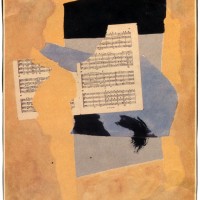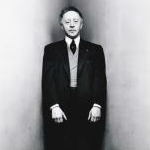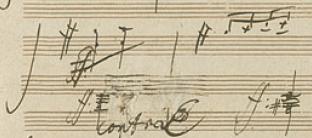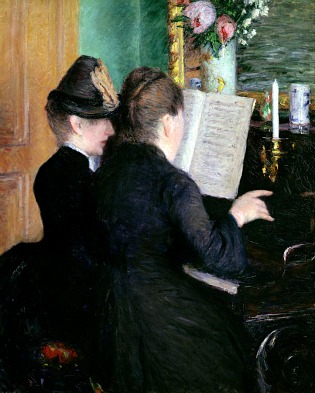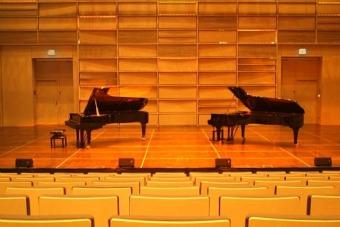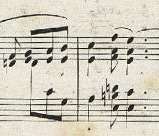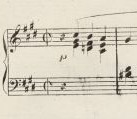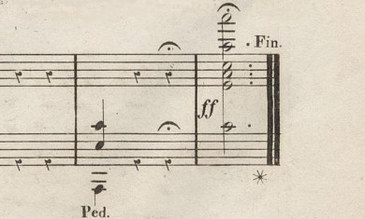As I hear my student playing the piano through Zoom, just for a moment, I think I am hearing Paderewski in 1912. The sound is imperfect. At moments it drops out. There are distortions of speed and rhythm. Yet, my ear, my mind is hearing music: completing and linking together the aural information that is there. As an adolescent, and thanks to the public library, I listened to a lot of recordings made by pianists of the early 20th … [Read more...]
Dispatched
Dispatched from the Audition Room (mit Bolzano auch dabei) After the third day of piano auditions at New England Conservatory, I attended an evening recital given at the school by one of my piano faculty colleagues. Backstage, he said that while he was playing he imagined my stern voice from the audition room. Making a fairly unpleasant face, he told me, "You know when you say, 'Mmmmm, not really good...'" The cold fact is that from about … [Read more...]
Misprision
In performing Billy Strayhorn's "Lush Life," some singers deliver the subtle, and possibly difficult to pronounce word combination "distingué traces" as "distant gay traces." A British lawyer or Harold Bloom might call this a "misprision." We may willfully twist a text to achieve a particular meaning. Or perhaps we are always getting it wrong. Bloom writes definitively: "Every poem is the misreading of a parent poem... There are no … [Read more...]
Ugly Beauty
"The first question I ask myself when something doesn't seem to be beautiful is why do I think it's not beautiful. And very shortly you discover that there is no reason." -- attributed to John Cage The sound coming from pianos (the physical, real sound) may displease the pianist. In trying out a concert piano, there are often several notes on the instrument that just can't be made to produce what is wanted. Those notes may need "voicing" -- a … [Read more...]
All beats are not created equal
All beats are not created equal. They are endowed by their makers with differing length... Well, not quite. But if we're describing rhythm as rendered live by human musicians then yes, beats vary, even in regularly-beated music played "in tempo." Computer produced beats do not have to vary, as some post-1980 pop music displays. In human-played rhythm, how much do beats vary? Or how much can beats vary and still be perceived as "equal"? … [Read more...]
Labor Management
Sound recordings from the first decades of the 20th century form a performance-practice treatise, documenting practices that may offer insight into music-making of earlier times. In the case of piano music, very many of these recordings are recordings of Chopin’s music. There are a lot of recordings of short pieces. (The length of one cylinder and later one “side” of a disc was around 3 minutes.) Chopin: Waltz in A Minor, op. 34, no. 2, Robert … [Read more...]
Word
The story told by Robert Levin involved snickering Italian waiters. Bob asked quite a few Italian speakers, "What does sfogato mean?" (An Italian-English dictionary will say something like “letting loose.”) The motivation for Levin's particular curiosity was the use of the term in the score of Chopin's Barcarolle (m. 78). It's a word that doesn't appear in (earlier) piano music. Frédéric Chopin: Barcarolle In this written music, "sfogato" … [Read more...]
Can’t get a word in
There is music that suffers in performance from conventionally good music-making. Mainstream classical playing seems to rely on clichés of "musicality" -- arching every phrase, breathing between groups, tracing all those lines up and then down again. Some pieces need different treatment. The first movement of Beethoven's Opus 101 is an extended, wordless run-on sentence. Theoretically, we may understand that no satisfying cadence in A major … [Read more...]
Why (not) demonstrate?
It's the routine of many piano lessons: Teacher sitting next to student sitting at the piano. One copy of the written music. Student and teacher examine it together. From time to time, teacher reaches over, or deseats student, in order to demonstrate details, or even phrases of the music. (In an unkind moment, I have called it "piano-teacher-position.") In an alternate version, the teacher occupies a second piano, demonstrating sound, techniques, … [Read more...]
Piano ear
Pianists may need different kinds of hearing than what's needed to play the violin. Because the tuning of pitch doesn't require constant attentiveness -- I'm convinced there are rather good piano players who actually hear very little of what's happening as they play. More than other musicians, pianists are likely to intone or moan audibly while playing. It's pretty conclusive evidence that whatever those players hear is not objective. The … [Read more...]
Simultaneous transmission
Next week, I'm playing an overlapped, simultaneous concert with Francesco Tristano, this time at Le Poisson Rouge in New York. It's billed as "[ Simultaneo ]." In the advertising it says: "Two concerts at the same time!" A manifestation of remix culture for sure -- it's Girl Talk Classical! In Echternach in 2009, we did an overlapped performance, a continuous 70 minutes of sound made with two pianos. Glass's music was overlaid with Carl Craig. … [Read more...]
Used Up — or Barely Begun?
Is the most famous classical music so familiar, so often performed, that it's worn out? I've listened to Beethoven's "Appassionata" so frequently that it's rather difficult for me to hear the music, to accurately sense the real sound patterns being made on a particular occasion. (The mind slips into a "this-is-how-it-goes" mode that dulls perception.) Are icons like the Fifth Symphony or the opening of Carl Orff's Carmina Burana being used up as … [Read more...]
Lost Temper
In a good recent demonstration, Jonathan Bellman suggested that sequential passages in Chopin's piano music have greater content with less equally tempered tuning. The specific pitch proportions within intervals would have subtly changed as key-area changed, with the less equalized tuning of 19th-century pianos. Equal temperament remains a theory but is not a practical piano reality even today. Just listen... Technicians in my school … [Read more...]
Scoreless
Just before playing a program that began with Chopin's Opus 45 Prelude, I started to think through the beginning of the music. Backstage in the green room, I had no piano and no copy of the written score -- and I couldn't recall the spacing, the exact arrangement of the notes, of the first chords in the piece. Solo pianists who play a lot of music by memory tend to be concerned about forgetting. For many pianists, it's the main focus of … [Read more...]
Quick and Dead
There I was in the green room, about to play at the Gilmore Festival. Included on the program was Chopin's Polonaise-fantaisie -- music I've performed, coveted, engaged with, grappled with for 30 years. Over time, I've exorcised, from my playing of the piece, the details and atmosphere of Vladimir Horowitz' 1966 recording. (The sounds that were my first contact with this music.) Lately, I've been trying to construe the Polonaise-fantaisie's … [Read more...]



